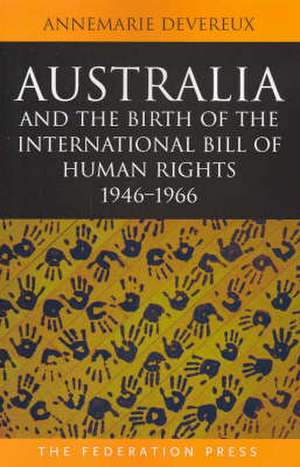Australia and the Birth of the International Bill of Rights
Autor Annemarie Devereuxen Limba Engleză Paperback – 30 sep 2005
Preț: 188.96 lei
Preț vechi: 258.63 lei
-27% Nou
Puncte Express: 283
Preț estimativ în valută:
36.17€ • 37.62$ • 30.31£
36.17€ • 37.62$ • 30.31£
Carte indisponibilă temporar
Doresc să fiu notificat când acest titlu va fi disponibil:
Se trimite...
Preluare comenzi: 021 569.72.76
Specificații
ISBN-13: 9781862875623
ISBN-10: 1862875626
Pagini: 306
Dimensiuni: 241 x 156 x 19 mm
Greutate: 0 kg
Editura: Federation Press
ISBN-10: 1862875626
Pagini: 306
Dimensiuni: 241 x 156 x 19 mm
Greutate: 0 kg
Editura: Federation Press
Cuprins
Contents Introduction Situating this research Structure, scope and sources Setting the scene: The international and domestic setting 1946 – 1966 Part 1 - Defining Human Rights Guarantees Economic and Social Rights Civil and Political Rights Minority Rights and the Right of Peoples to Self-Determination Jurisprudence of Human Rights Part 2 - Implementing Human Rights Domestic Implementation of Human Rights International Implementation of Human Rights Human Rights and 'domestic Jurisdiction' Conclusion Bibliography Appendix 1 Timeline Appendix 2 The International Bill of Rights (excerpts)
Recenzii
It is fascinating both for the history and the law that it contains. I congratulate Federation for publishing the book and am very grateful to have it in my library. Justice Michael Kirby AC CMG, High Court of Australia The author’s analysis … is an important contribution to the jurisprudence of human rights. … the study shows that the negative attitudes evinced by the Australian government in recent times towards the views of the supervisory treaty bodies have deep roots. This analysis is of special interest to those, like me, who regret Australia’s recent criticisms of the treaty body system, … [It] will help to put these and other current events into a longer perspective … It may help us to understand how these policies developed and to find more effective ways to influence future directions when times are more propitious. The Hon Elizabeth Evatt AC, from the Foreword (in full below) This book provides an important insight into Australia’s approach to human rights in the formative post war period when the International Bill of Rights, the International Covenant on Civil and Political Rights and the International Covenant on Economic Social and Cultural Rights were developed. Devereux charts how, in the space of two decades of policy making, Australia’s approach to international human rights shifted from active support for the state’s role in protecting human rights, to a reluctance to institute government action to guarantee rights. Drawing on extensive archival material, this well-documented study reveals the extent to which Australia’s policy responses to human rights issues were the product of the political values of Ministers, senior officers and diplomatic representatives. Devereux’s book is a rich resource for scholars of human rights: readers will enjoy her account of Australia’s retreat from its initial enthusiasm for international enforcement of human rights, as well as the insight into the depth of Australia’s resistance to the rights of minorities and the rights of peoples to self-determination. The concluding chapter, “Back to the Futureâ€, powerfully observes the resonances between the policy shifts during the post war period and current debates about Australia’s interpretation and implementation of human rights obligations. The result is a challenge to the reader to consider the philosophical underpinnings of Australia’s approach to human rights, then and now. Human Rights Law Bulletin, November 2005
